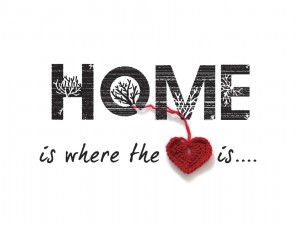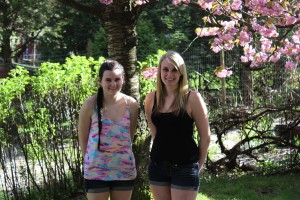I really enjoyed this assignment. I have never been able to do a creative writing assignment for any of my previous classes and thought this was a really good way to express how one sees a story. A story is a thing which can be questioned or changed, which allows for many beliefs and opinions all of which have validity. Enjoy!
The world was created through the eyes of imagination and belief by a man searching for a new home and a new adventure. The man lived in a world that was paradise; water, land and food, but there was a cost to this perfect world. He was the only inhabitant. The days went by and he learned to swim, cook and build a shelter. Yet, the man yearned for something else and wondered if there was another place where there were other people. So with his building skills he built a boat. This boat was not very large, just enough space for him and his few belongings. A barrel of water, a few herbs and plants and some extra bark in case the boat was to leak. Upon the following morning, the man pushed off from the only place he knew, and with a last glance behind him, set off for the unknown.
The sun rose and the sun set for many days and there was no sign of any new land or people. The man began to doubt his adventure and wished for a moment that he was back in his own personal paradise. Why has he left such an amazing place, he was in need of nothing to survive. On the third day of his sailing, the man heard a rush of water, but it was not raining. The sky was clear and the only sound that water made to the man was that when it fell from the sky. “What could this noise possibly be?” the man thought. The water around the boat began to move faster and before the man knew he was falling down the most beautiful waterfall. His boat plunged into an abyss and his world went black.
He woke up to see a vast ocean in front of him. He heart sank, for he had come all this way and there was no land. The water stretched as far as he could see, but amidst the continuous blue he noticed a sail, which he presumed, must be attached to a boat. Arriving at this small vessel he was met by a young child who looked hungry. Upon seeing this new face the man exclaimed “I am new to this place and you are the first person I have ever met. From where I came there was only me.” The child looked to him and said “I am but a hungry explorer. Could you spare some food?” The man then passed the child his remaining food, upon which the child smiled, and continued on their way. The man grew desperate for land, for now he had no food.
Voyaging onward the man was met by a woman in a canoe. “I am but an explorer looking for a new home, but my canoe has a leak and it is filling with water. Can you spare some wood?” she asked. The man passed her his remaining wood upon which she placed at the bottom of the canoe. “Thank you” was all she said and was on her way. Now the man had no food and no wood to fix his aching boat.
At last, as this sun began to set, the man came upon an older man and woman in a sailboat. Before they spoke, the man passed them the last of his freshwater. They smiled, and before the couple sailed by the older man said “You have showed us compassion at a time when you look like you needed it. You will be well rewarded for your actions. You see young man, beyond this sea there is a place where you will find what you are looking for. Just believe in it and you shall see.” The man looked in front of him and all he could see was the water. Water, water, water.
He closed his eyes. He imagined a place where he would live among other people, build a home, have a family. By giving the passing people he met along his journey, he committed to the fact that he would have nothing. And something cannot come from nothing. And yet, with a little belief, and a little imagination it can. Among the campfire the man tells his story to his growing children. They smile and laugh, as this story seems an impossibility. Land cannot come from believing it shall be. The man looks towards the stars, and knows that through his kindness and his belief that by venturing from his comfortable abode he will find happiness, showing that anything can be achieved.
Reactions To The Story:
When I told the story to my sister she asked “Why did the man not just stay in his paradise?” And at first that would seem like the best option for him; he had everything he needed to survive and be content. She also said that most people, along a journey such as his, would not have given these strangers his last remaining food and water. This made me think about our own culture and how people do not always share or help others. My story almost fantasizes the fact that a person will always help those in need (even if it affects their own life) as this is not always seen in our society. I made the man in my story help others so that he would be able to achieve his goal in reaching a new home. By giving the little that he had he was able to reach his goals (my sister said this seemed little farfetched). I explained how the story related to the retelling of the original story and how our assignment was to recreate it, but still keep some elements in it. She saw the evil in my story as moving from paradise to a place unknown, and how my story could be changed so that the people he meets are unkind and not what he expected. Words can be altered and changed, but for those who are listening or telling must be careful as to what words they choose to use.
After I told the story my sister said that if a story is changed from the original, was the original changed from a pre-exisitng story? Stories in a sense can be passed down from generation to generation and the creation of a new story can always be linked to different stories too. In a sense then, from my sister’s standpoint, all stories are related to each other which form a coherent bond which helps the reader to connect to the story itself.
“What did Jesus Mean by Paradise?” The Dawn Christadelphians. Bible-UK. Web. 15 Feb. 2015. <http://www.bible-uk.com/index.html>
Coldplay Official. “Paradise.” Online video clip. YouTube. YouTube 18 Oct. 2011. Web. 15 Feb. 2015. <https://www.youtube.com/watch?v=1G4isv_Fylg>



